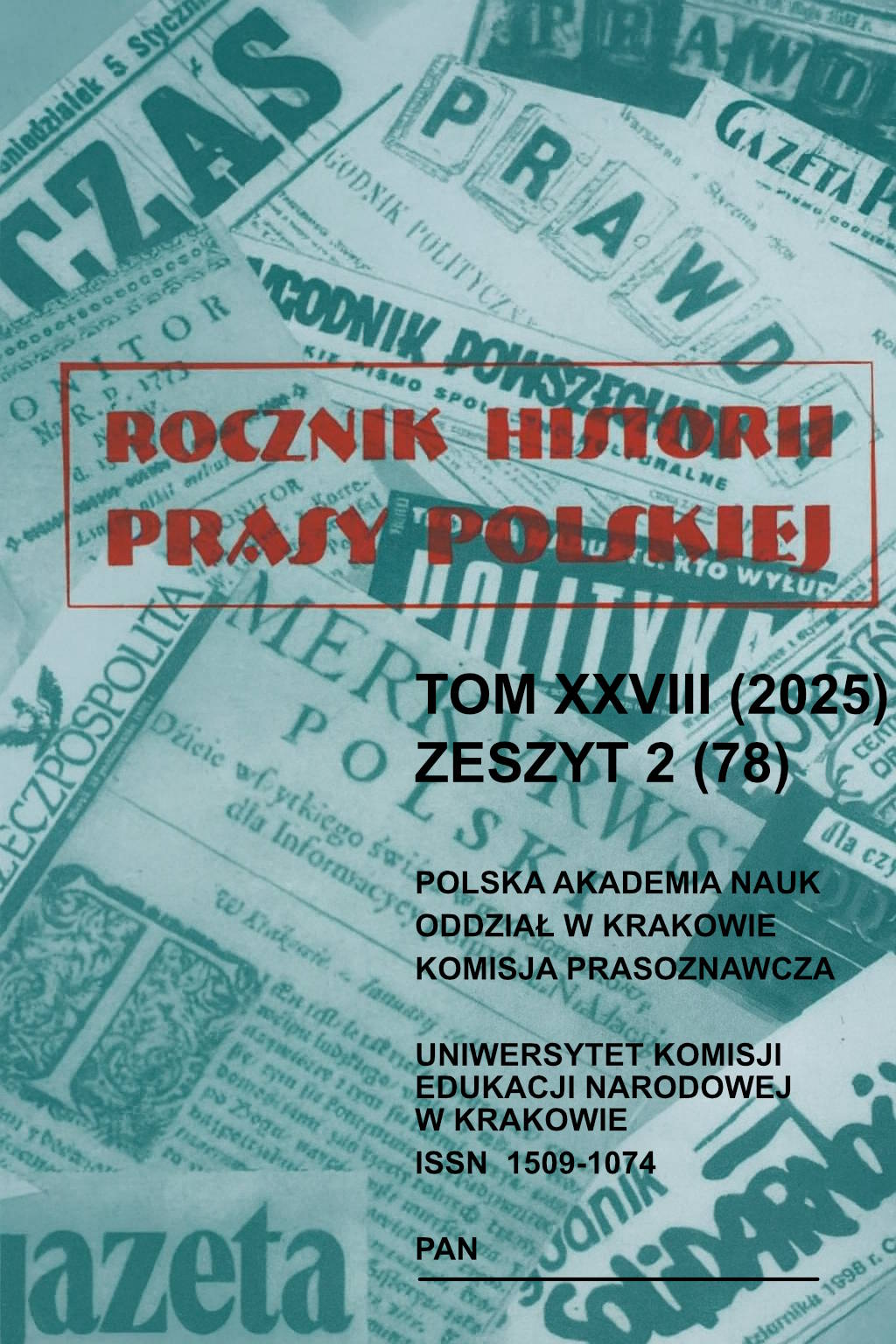Propaganda in the Płomyczek, a fortnightly children's magazine published in Moscow (1943–1946)
Keywords:
Polish press in the Soviet Union, Polish communists in Moscow, World War II, children's and juvenile press, communist wartime propagandaAbstract
This article presents a profile of the children's magazine Płomyczek [A Little Flame], a supplement to fortnightly newspaper Nowe Widnokręgi [New Horizons] published in Moscow between mid‑1943 and January 1946 by the Union of Polish Patriots (ZPP). For the most part its pages were filled with texts written by authors who were associated with the ZPP and classic children's literature from the didactic legacy of the Enlightenment and the 19th century. A systematic analysis of the magazine's content is aimed at identifying various aspects of its propaganda agenda and techniques. The title page of the Płomyczek usually displays a graphic evocation of a great historical event from the patriotic calendar, dressed up with elements of rural life and landscape. Most of the expository and narrative texts follow the official paradigm, in which Polishness is integrated into the historical workings of progress from the emergence of class society to the victorious struggle of the oppressed proletariat. The present is dominated a stark contrast between the situation of Poles who found refuge in the Soviet Union and those who have to live under the German occupation. The Germans are depicted as brutal and inhuman enemies; and, indeed, they are sometimes compared to animals. There can be no doubt that it is a war between good and evil, and this message keeps being driven home by drastic scenes that would normally be not shown to children. By contrast, in the Soviet Union people live safely in a well‑organized society. The Poles have a lot in common with the Russian, as the authors of the Płomyczek never tire to point out, and, by implication, nothing stands in the way of their cultural assimilation to the host nation. Propaganda through the use of associations, images and symbols is more peculiar to verse, most of which was home‑made. As far as poems from the interwar period are concerned, the editors picked up only those that carried the right ideological message.
References
Źródła
„Płomyczek” (1943–1946): dodatek do „Nowych Widnokręgów”.
Wspomnienia
Broniewska J., „Płomyczek” w Związku Radzieckim [wspomnienia], [w:] „Nasza Księgarnia”: 40 lat działalności dla dziecka i szkoły, Warszawa 1961, s. 75–78.
Jędrychowski S., „Nowe Widnokręgi” (część I). Ze wspomnień, „Kwartalnik Historii Prasy Polskiej” 1980, R. XIX, nr 1, s. 83–92.
Jędrychowski S., „Nowe Widnokręgi”. Ze wspomnień (część II), „Kwartalnik Historii Prasy Polskiej” 1980, R. XIX, nr 3, s. 119–135.
Jędrychowski S., „Nowe Widnokręgi”. Ze wspomnień (część III), „Kwartalnik Historii Prasy Polskiej” 1980, R. XIX, nr 4, s. 45–61.
Opracowania
Bartoszewicz M., Teorie propagandy w obliczu algorytmizacji internetowego komunikowania społecznego, „Kultura Współczesna” 2019, nr 1(104), s. 84–98.
Cieślik A., Wielki skandal polityczny „Płomyka”, „Zeszyty Prasoznawcze” 2004, nr 1/2, s. 102–112.
Głowacki A., Na pomoc zesłańczej edukacji. Działalność wydawnicza Komitetu do spraw Dzieci Polskich w ZSRR (1943–1946), wyd. 2, Łódź 2019.
Lasswell H.D., The Theory of Political Propaganda, “The American Political Science Review” 1927, Vol. 21, Issue 3, s. 627–629.
Michalska I., Czasopisma Związku Nauczycielstwa Polskiego dla dzieci w okresie Drugiej Rzeczpospolitej, Łódź 1994.
Prokop J., Sowietyzacja i jej maski: PRL w latach stalinowskich, Kraków 1997.
Rogoż M., „Płomyczek Afrykański” (1943–1945) dwutygodniowy dodatek dla dzieci do „Polaka w Afryce”, „Rocznik Historii Prasy Polskiej” 2021, z. 1, s. 95–112.
Rogoż M., Czasopisma dla dzieci i młodzieży Instytutu Wydawniczego „Nasza Księgarnia” w latach 1945–1989. Studium historycznoprasowe, Kraków 2009.
Rybak K., Mechanizm i skutki funkcjonowania propagandy w Związku Radzieckim na przykładzie rozważań Stanisława Cata-Mackiewicza w książce „Myśl w obcęgach. Studia nad psychologią społeczeństwa sowietów”, [w:] Dezinformacja — inspiracja — społeczeń- stwo: social cybersecurity, red. D. Boćkowski, E. Dąbrowska‑Prokopowska, P. Goryń, K. Goryń, Białystok 2022, s. 79–96.
Żyromski M., Propaganda w systemach totalitarnych, Poznań 2015.
Downloads
Published
How to Cite
Issue
Section
License
Copyright (c) 2025 Yearbook of the History of Polish Press

This work is licensed under a Creative Commons Attribution 4.0 International License.

